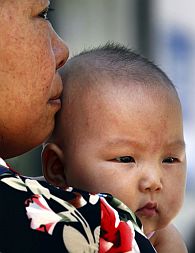 | « Back to article | Print this article |
 A new provincial draft law in China imposing heavy penalties on unmarried women bearing children has come under severe public criticism.
A new provincial draft law in China imposing heavy penalties on unmarried women bearing children has come under severe public criticism.
The draft legislation that includes fines for unmarried mothers in Wuhan city in Central China has sparked controversy among experts and residents, official media in Beijing reported.
The Regulation on Wuhan's Population and Family Planning Management, released by the city's legislative affairs office, imposes financial penalties on unmarried mothers, including those who have a child with a married man and are aware the man is married, state-run China Daily reported on Monday.
The aim is to intensify family planning management and keep the birth rate at a low level, according to the regulation.
China still continues to follow the one-child policy strictly.
Authorities released the draft online saying that they will accept public suggestions and comments until June 7.
If approved, the regulation will replace similar rules issued in 2010.
The draft states that an unmarried mother must pay a fine equivalent to at least twice the average income in the previous year.
According to China's family planning law, rule-breakers have to pay "social compensation fees", and government employees also face administrative punishments.
In many areas, the fine is equivalent to at least three times the average income for the previous year.
"Wuhan's commission will take into account public opinion and submit the amended regulation to the people's congress for approval before it can be carried out," a health and family planning commission official for Wuhan, said on Sunday.
According to 2011 figures, the numbers of single women are growing rapidly as more women took to work. According to some estimates, unmarried women account for near 20 per cent of the total female population.
However Yuan Xin, a professor of population studies at NankaiUniversity, said although the regulation is meant to check the number of children born out of wedlock, it fails to consider the complexity of society and is tough to implement.
As Chinese society becomes more open and diverse, families are also becoming diversified, and new problems have made family planning more complex, he said.
"For example, the number of people who choose to be single has increased rapidly in recent years," Yuan said.
"If the regulation is carried out, such people will not be able to legally have a child, which is irrational. Besides, how can you define that an unmarried mother is or is not aware that the father of her child is married?", he said.
The regulation needs to be explained in greater detail before it can be carried out effectively, Yuan added.
The move has also caused controversy among residents.
"The regulation is ridiculous. What if a woman has a test tube baby without getting married, should she also be fined," Wang Qiong, a Wuhan University professor asked.